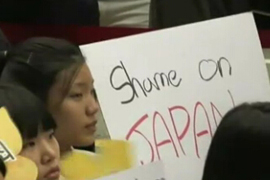S Korea's anniversary of Liberation Day

 0 Comment(s)
0 Comment(s) Print
Print E-mail CNTV, August 18, 2014
E-mail CNTV, August 18, 2014
Today marks the 69th anniversary of South Korea's liberation from Japanese occupation, following Japan's World War II surrender in 1945. Celebrations this year come amid strained ties between Seoul and Tokyo, over what South Korea claims as Japan's failure to address historical grievances. Our correspondent Shane Hahm takes a closer look at how the past still affects the current bilateral relationship.
Liberation Day in Korean literally translates into "the restoration of light." It marks the closing of a dark chapter in the country's history.
On this day, South Koreans congregate to Independence Hall, which honors those that fought against more than three decades of Japanese occupation during the early 20th century.
"Unfortunately our country had its sovereignty taken away for 35 years. Independence Hall accurately illustrates this history through exhibits," said Kim Nung-jin, President of the Independent Hall of Korea.
Diplomatic ties between Seoul and Tokyo are at one of the lowest points since the end of World War II. One reason is the unresolved issue of Japan's wartime sexual enslavement of Korean women.
South Koreans demand a formal apology from the Japanese government. Demonstrators have held a weekly rally in front of the Japanese Embassy now for more than two decades.
For these former sex slaves, Liberation Day has a different meaning.
"For the surviving victims, Liberation Day is not a celebration. Because the victims feel like they have yet to be liberated," said Yoon Mee-hyang, from the Korean Council for Japanese Militery Sex Slaves.
In addition to the World War II sex slave issue, South Korea and Japan are at odds over a disputed set of islands in the waters that separate the two countries. And many here in South Korea are concerned about Japan's Abe administration and its nationalistic policies that undermine the two countries' history. So what needs to be done to mend ties and move forward?
Karl Friedoff at the Asan Institute for Policy Studies says the South Korean public is willing to improve ties, but President Park Geun-hye needs to take a more active role.
"If you look at the larger survey data and the general public at large, everyone is supportive of moving forward with Japan and improving relations. She just has to show the leadership to be willing to take that risk," said Karl Friedoff, from ASAN Institute for Policu Studies.
Experts say there's no denying the two countries share common economic and social interests. But to move forward diplomatically, both sides must agree on the past before aiming toward the future.






Go to Forum >>0 Comment(s)